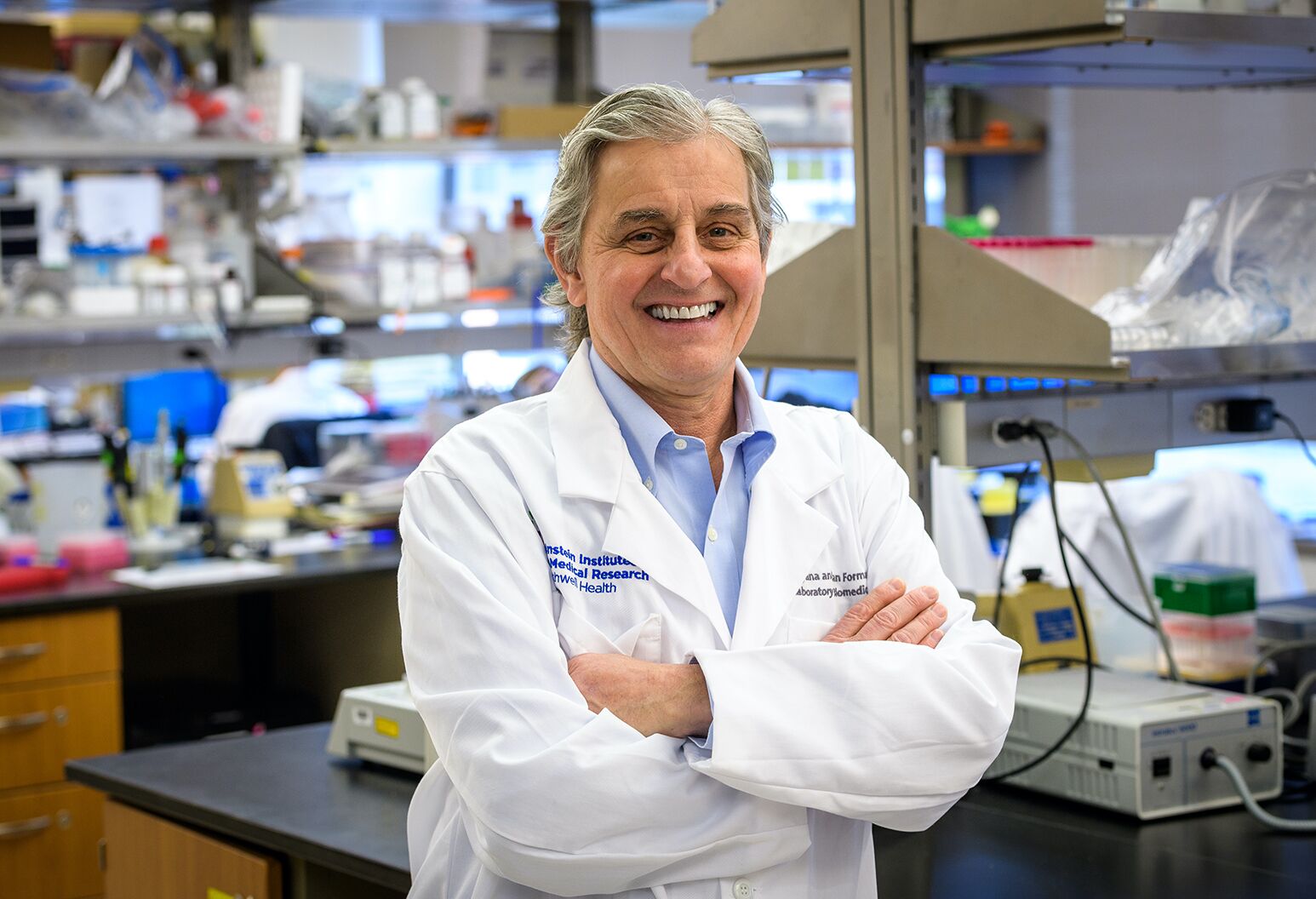1999
The Feinstein Institutes for Medical Research is established. In 2005, Kevin J. Tracey, MD, appointed president and CEO.

The Feinstein Institutes for Medical Research is the global medical and scientific home of bioelectronic medicine (BEM), which combines molecular medicine, neuroscience and biomedical engineering. At the Feinstein Institutes, medical researchers use modern technology to develop new device-based therapies to treat disease and injury. Built on years of research in molecular mechanisms of disease and the link between the nervous and immune systems, our researchers discover neural targets that can be activated or inhibited with neuromodulation devices, such as vagus nerve implants, to control the body’s immune response and inflammation. If inflammation is successfully controlled, diseases — such as arthritis, pulmonary hypertension, Crohn's disease, inflammatory bowel diseases, diabetes, cancer and autoimmune diseases — can be treated more effectively. Beyond inflammation, using novel brain-computer interfaces, our researchers developed techniques to bypass injuries of the nervous system so that people living with paralysis can regain sensation and use their limbs. Bioelectronic medicine holds the promise of being able to treat disease and injury through nerve stimulation and without the use of costly and potentially harmful pharmaceuticals.
The Feinstein Institutes for Medical Research is established. In 2005, Kevin J. Tracey, MD, appointed president and CEO.
Dr. Tracey’s lab makes a discovery, published in Nature, that the nervous system reflexively regulates the inflammatory response in real time. The inflammatory reflex is proposed as an experimental inflammation treatment through selective and reversible 'hard-wired' neural systems.
The Feinstein Institutes establishes the Center of Bioelectronic Medicine, now the Institute of Bioelectronic Medicine, naming Yousef Al-Abed, PhD, its director and bringing together experts in molecular medicine, neuroscience and bioengineering to collaborate on advancing this new field.
Convened by Feinstein Institutes, the Journal of Internal Medicine, Karolinska Institutet and the Royal Swedish Academy of Sciences, a first-of-its-kind conference on bioelectronic medicine is held. The Feinstein Institutes continues to host a bioelectronic medicine forum at least every other year.
Chad Bouton joins the Feinstein Institutes after publishing in Nature the first demonstration of successfully controlling muscle activation using intracortically recorded signals in a paralyzed human with the use of a motor cortex brain implant.
Feinstein researchers, including Sangeeta Chavan, PhD, publish clinical trial results in The Proceedings of the National Academy of Sciences that show an implantable vagus nerve stimulator in rheumatoid arthritis patients significantly inhibits TNF production and reduces disease severity.
Cynthia Aranow, MD, Feinstein professor, presents, at the American College of Rheumatology/Association of Rheumatology Professional's Annual Meeting, pilot clinical trial results showing that a bioelectronic medicine device was effective in reducing pain and fatigue in patients with lupus.
Theodoros P. Zanos, PhD, Feinstein Institutes assistant professor, publishes, in Proceedings of the National Academy of Sciences, the first research to decode specific signals the nervous system uses to communicate immune status and inflammation to the brain.
Dr. Chavan and colleagues standardize an experimental protocol to record signals transmitted in the vagus nerve, which is published in Bioelectronic Medicine.
In a collaboration between Feinstein Institutes and GE Research, researchers publish study results that allow scientists to isolate and decode specific neural signals recorded from the vagus nerve to discriminate between the cytokines IL-1 and TNF.
Using custom textile-based electrodes to form a light-weight, wearable device, Prof. Bouton and his research team develop and assess closed-loop methods to regulate individual finger forces to facilitate functional movement in paralyzed study participants.
Drs. Chavan and Tracey and their lab discovers a cluster of cholinergic neurons residing in the brainstem dorsal motor cortex control TNF production, revealing a role for brainstem coordination of immunity, which is published in Proceedings of the National Academy of Sciences.
Lopa Mishra, MD, is named co-director for the Institute of Bioelectronic Medicine at the Feinstein Institutes.
GE and Feinstein researchers publish data in Scientific Reports showing the efficacy of hepatic focused ultrasound for alleviating obesity and obesity-associated complications in mice and suggest hepatic focused ultrasound as a possible novel noninvasive approach in the context of obesity.
Timir Datta, PhD, Feinstein Institutes assistant professor, develops a fully implantable chronic wireless bidirectional neuromodulation system for mice to help accelerate discovery and translation of future bioelectronic therapeutics.
Another study from GE Research and Feinstein Institutes researchers, published in Nature Biomedical Engineering, finds that non-invasive ultrasound activation of afferent autonomic nerves may represent a non-pharmacologic therapy for the restoration of glucose homeostasis in type-2 diabetes.
Feinstein researchers are awarded a multi-year, $6.7 million National Institutes of Health grant to create the first-ever detailed anatomical map of the human vagus nerve. The research is led by Stavros Zanos, MD, PhD, Theodoros Zanos, PhD, and Larry Miller, MD.
Prof. Bouton and a team of researchers at the Feinstein Institutes restore function and sensation in a quadraplegic man's limbs using an implanted double neural bypass.
Our representatives are available to schedule your appointment Monday through Friday from 9am to 5pm.
For a Northwell ambulance, call
(833) 259-2367.